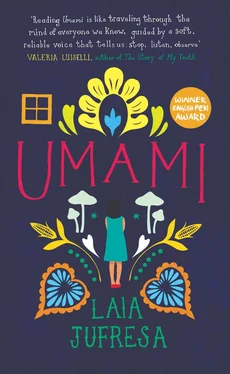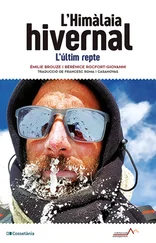‘Look!’ shouts Pina, pointing to the basil I planted two weeks ago.
Some little flowers have blossomed on it. I call Mom and she opens the sliding door. She’d been practicing in the living room and has red eyes and a vague smile, like she does when she tells us she’s sorry.
‘You need to pull them off,’ she says, pointing to the basil with her cello bow.
‘Why?’
‘If you leave them on the leaves fall off, and the leaves are the bit you eat.’
‘Why?’
‘Just listen to me, will you?’ she says, and slides the door shut. One by one, Pina and I pull off the little flowers. It occurs to me that if I’d known, I could have taken them to the cemetery. It’s a silly idea: they’re tiny. But Luz was too. Tiny, I mean. She used to sit on my lap, hug her legs, then curl into a little ball so that I’d hold her.
‘Squeeze!’ she’d say.
Sometimes I was scared I’d hurt her or break something, and I always let go sooner than she wanted me to. We all did. My brothers held on a bit longer, but not much. Luz always wanted to be squeezed more.
‘Squeeze, squeeze, squeeze!’ she begged Dad, and he would squeeze her with a single arm.
I don’t want to, but I can’t help imagining her in her box, in the cemetery. But that’s another silly idea because there’s not even anything in that box. It was too expensive and complicated to bring the body back to Mexico.
‘What?’ I ask Pina, who’s staring at me.
‘Are you crying?’ she says.
‘Are you stupid?’ I say, and she goes off in a sulk.
The woman is absurdly beautiful. That’s how Marina sees her: with an adverb. She shouts to be heard above the racket of the hail against the tile roof:
‘You’ll go to heaven for this, missy!’
‘Thanks,’ Marina says, because she can’t think of anything else to say. But what she’s really thinking is, ‘An evangelist!’ and ‘I am such an idiot!’ And then, this time in her brother’s voice, ‘You have opened the door to an unknown, soaking wet, and possibly dangerous evangelist.’ But she can’t stop staring at her.
‘I’m a friend of Beto and Pina,’ the woman yells, pointing to the house on her left. ‘Do you know Pina? Does she still live there?’
Relief. Marina knows Pina. She’s Linda’s kids’ little friend, and yes, she lives with her dad in Sour House.
‘They’re not in?’ Marina shouts.
‘Do you think I could come in for a second?’ the woman shouts back.
Marina thinks, ‘No,’ but says, ‘Of course.’
They run to her house. Marina opens and closes the door with a yank and a shove. You can’t even hear the door slam for the storm. Her feet are soaked. The damn drains in the mews become blocked at the first drop of hail. She kicks off her flip-flops and dries her feet, rubbing each one against the opposite thigh.
The woman emerges from under the black trash bag and, after studying it for a second like she’s making sure she hasn’t left anything valuable in there, she reopens the door and tosses the bag out into the passageway. This surprises Marina, maybe it even annoys her a little, she can’t decide. Is the woman going to take the bag with her when she goes, or leave it there as a memento? Will the bag get caught up among her plant pots or will it float off toward the bell, or even to her landlord’s doorstep? The woman shuts the door again and Marina thinks to herself how, even on the balmiest, rain-free day she wouldn’t have heard it closing, so gracefully and soundlessly the woman carries herself. What’s more, whereas before she seemed stooped under her bag, now Marina can appreciate how upright she is. She feels another wave of fear, but this time it’s quieter, perhaps offset by her curiosity: it sounds less like one of her brother’s reproaches and more like the muted hum of a neighbor’s radio. ‘She’s no evangelist,’ says the radio host. ‘But a hardened criminal, maybe? A member of an elite kidnapping gang?’
The woman rubs her arms and shakes out her thick black hair. Then she takes a moment to stretch, and in one long breath regains her natural shape and size. Short, but seemingly taller with her plumb, proud posture, the woman fills the space she occupies. She’s also dripping wet. She points to a broken chair next to the door and Marina says, ‘Be my guest, ma’am.’ But the woman doesn’t sit down; she hangs her jacket on the back. It’s an oversized denim jacket.
‘This is really so cool of you,’ says the woman as she unties her scarf: a flimsy, tie-dyed thing, so youthful it ages her.
‘Come in, ma’am,’ Marina says.
‘Bah, let’s drop the formalities,’ says the woman, drying her hair with the scarf.
‘Come in,’ Marina says, pointing her to the living room. ‘I’ll get you a towel.’
The last time Marina spoke to her dad on the phone, he said, totally out of the blue, ‘You’re not a little girl anymore, Dulce Marina.’ And she felt robbed, because that’s what she’d been telling him since she was about twelve! And now he was trying to take the credit for discovering the fact, not only robbing it from her but also slyly sugarcoating it in her full and sickly name (Sweet Marina, ugh), which no one apart from him and the Federal Electoral Institute ever used. She’d felt like the victim of a postal crime; like he’d stolen a letter she was expecting. It had been deeply infuriating, but all she had managed to say to him was, ‘I know, Dad.’
And he’d gone on:
‘At your age your mom had already had her first child.’
‘I know that too.’
After they’d hung up, Marina welcomed a kind of pure, clean rage: a healthy development. But now, the taste of that rage comes back to her as she looks around the bathroom for the least dirty towel. She really did not like the tone of the woman’s ‘let’s drop the formalities’, as if she were the host and Marina the intruder. Marina inspects herself in the mirror for a few seconds, no longer than that, but long enough for her to feel embarrassed about how long she’s taking, because she is, after all, the host. She grabs the green towel, the one she uses least, and heads back.
She finds the woman sitting on the yellow sofa. Not leaning back into it; just perched on the edge, very erect, but not tense. Quite the opposite in fact: she looks perfectly at ease. (Mellow-yellow.) And Marina feels irritated again. How can this woman seem so comfortable here in her home, as if they’d had a prearranged appointment, as if she were a social worker sent to check if Marina is sticking to her recommended daily intake of calories? Marina doesn’t know how to hold her back straight without stiffening all over, and as a general rule she resents people with good posture.
The woman points to the wall opposite the whozac wall.
‘What is Doctor Vargas doing up there?’
Marina flinches. It takes her a moment to take in the fact that this woman knows her neighbors.
‘Her husband commissioned me to paint her portrait,’ she answers. ‘But in the end he didn’t want to hang it in his house. He paid me and everything, it’s just he gave it back.’
‘Maybe he didn’t like it.’
‘Maybe.’
‘I’m not saying it’s ugly.’
‘He asked me to paint it like that. In the style of Joaquín Sorolla.’
‘They always were a little pretentious.’
‘Can I get you a coffee?’
‘Do you have tea?’
‘Chamomile.’
‘I’ll take that.’
Ugh, thinks Marina as she puts the kettle on. She really didn’t like that response at all; like it was a concession on the woman’s part. Nor does she like her turning the TV off without asking. Or the fact that she wasn’t even the slightest bit surprised to learn that Marina is a painter and that people actually commission her to paint portraits. When Linda first saw the portrait she’d cried, ‘Bravo!’
Читать дальше












